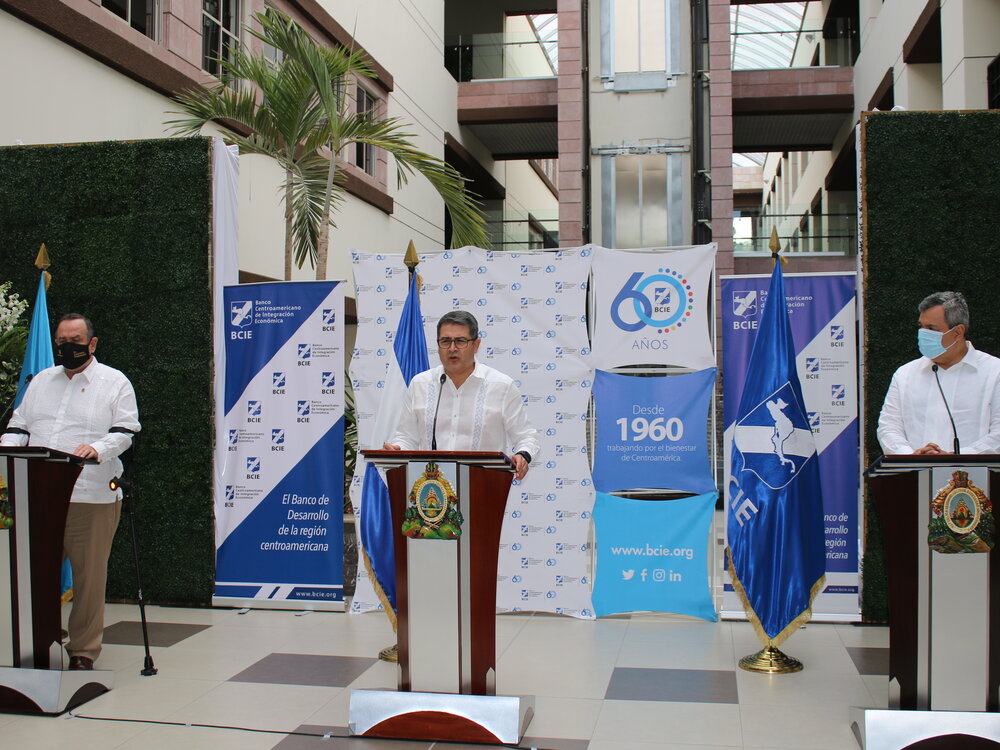In meeting with Central American Presidents, CABEI Launches US$2.5 Billion Central American Program for Resilient Reconstruction in Response to Natural Disaster Emergencies

CABEI responded quickly to address potential resource requirements to mitigate the damage caused by Hurricane Eta and the potential damage that Hurricane Iota will cause.
Tegucigalpa, November 16th, 2020.- In the context of a work meeting of the Presidents of Honduras, Guatemala, Nicaragua, Costa Rica and El Salvador's Minister of Finance, the Central American Bank for Economic Integration (CABEI) announced the approval of the Central American Program for Resilient Reconstruction with an available amount of US$2.5 billion, available to countries upon request, which is designed to finance projects that address and prevent disasters and calamities in order to adapt to the effects of climate variability and change, to restore livelihoods and create socio-economic opportunities in affected communities.
The leaders expressed the need to have a joint roadmap for resource mobilization, in view of the national emergency caused by Hurricane "ETA", category 4 on the Saffir-Simpson scale, and the still unquantifiable impact that Hurricane IOTA could cause, in a context that becomes indisputable to face the magnitude of the current crisis, working together as a region to prevent a deep deterioration of our peoples' living conditions.
Additionally, the Central American Presidents said that in moments of crisis, opportunities are born, so it is appropriate to build a Central American Strategic Agenda to address climate variability and climate change, establishing an adequate risk management system.
The Central American Program for Resilient Reconstruction will allow for the strengthening of national preparation and response systems with regard to emergencies or disasters that affect the countries. CABEI will also provide resources for the preparation of climate change adaptation projects that can be financed and finance operations that will allow countries to prevent and face natural disasters. Finally, the Bank's financial strength will allow it to issue securities in the regional and international capital markets specialized in housing bonds, social development, resilient housing, as well as to innovate in new initiatives and instruments such as climate insurance for the region, among others.
"CABEI will double the level of non-reimbursable technical cooperation to prepare integral projects according to the countries' needs and will make long-term financing available to Central American countries to implement actions to address the emergency caused by natural disasters. CABEI will seek the support of the international community and the private sector to alleviate material losses, damage to homes, floods, landslides on roads, attention to those affected and other risks inherent to the emergency," said CABEI's Executive President, Dr. Dante Mossi.
Likewise, President Mossi made an emergency call to the international cooperation community and the official development aid agencies, to coordinate the reconstruction plans, a week before the announcement in which, in coordination with the Inter-American Development Bank (IDB) and the World Bank (WB), they will support the Central American countries especially affected by the passage of hurricane Eta and now Iota. For its part, CABEI will make $2.5 billion available, including the mobilization of external resources, for the period 2021-2022, in order to leverage public and private investment derived from the Program.
During the meeting, the presidents requested CABEI's orientation and accompaniment to access the different green fund windows in an agile and timely manner, in order to favor the financing of interventions to provide immediate response to our countries' affected population.
On the other hand, Dr. Mossi explained that the program has the following components: emergency aid, Technical Assistance and Investment Project Preparation Funds, Public Investment Program; Private Investment Program; Green, ESG and Thematic Bonds and Knowledge Development and Management on Climate Change Adaptation.
The Central American Heads of State indicated that, in order to achieve the regional agenda, the support and accompaniment of the Central American Bank for Economic Integration (BCIE), as well as other international organizations and friendly countries, is fundamental, with the objective of achieving the mobilization of resources required for the reconstruction and national transformation process that our governments have undertaken before the international community. To that end, the leaders asked the bank to work on three types of financial instruments that would be adapted to each country's reality, such as: loans with favorable conditions for the fiscal situation, agricultural insurance designs, as well as specialized coverage to face natural disasters and non-reimbursable international cooperation, to develop an agenda that would contribute to mitigate climate change risks.





